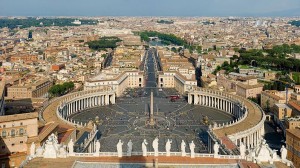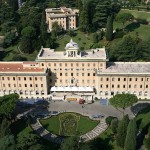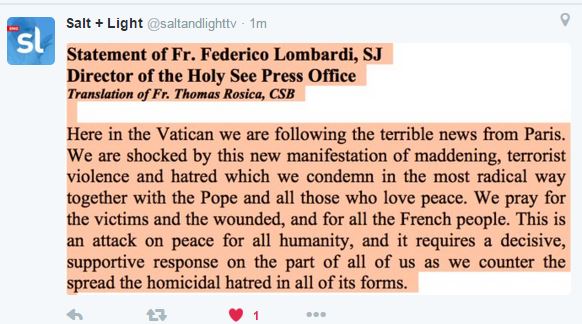Last week, word broke that Pope Francis had established a new dicastery, essentially streamlining the bureaucracy by uniting under one head three major concerns of the Church: namely, the laity, the family, and the life issues.

Image: Wikimedia Commons
On October 22, during the afternoon session of the Synod of Bishops on the family, Pope Francis announced to the synod fathers gathered that he would combine the work of two pontifical councils and a pontifical academy:
“I have decided to establish a new dicastery with competency for laity, family and life, that will replace the Pontifical Council for the Laity and the Pontifical Council for the Family. The Pontifical Academy for Life will be joined to the new dicastery.”
But not so fast! Although the reorganization has been under discussion by the Pope’s International Council of Cardinals for months, there is still work to be done before the plan can be fully implemented. A new commission has been appointed to outline the responsibilities of the new office. And Catholic News Service reported that Pope Francis said that the special commission’s text on its competencies will be presented for discussion to the Council of Cardinals, which is scheduled to meet Dec. 10-12.
So the earliest one could expect to see full implementation of the new organization plan would be early 2016.
* * * * *
Apparently, though, there is concern that someone in the Vatican may “jump the gun”–no longer following policies established by the already existing dicasteries, or hiring or transferring staff in anticipation of the changes.
To head off any premature jostling of staff in the Holy See offices, Pope Francis wrote a letter today to Cardinal Pietro Parolin, the Vatican’s Secretary of State, clarifying the need for constancy during this reform of the structures of the Roman Curia. The Holy See has just released the full text of the letter:
“While the process of reform of various structures of the Roman Curia, to which the Council of Cardinals I instituted on 28 September 2013 is dedicating its attention, is continuing in accordance with the established programme, it is necessary to note that certain problems have emerged in the meantime, in relation to which I intend to take prompt action.
I wish first to state that the current period of transition is not a time of vacatio legis. Therefore, I confirm that the Apostolic Constitution “Pastor bonus” and subsequent amendments thereto remain in full force, along with the General Regulations of the Roman Curia.
Since compliance with the common rules is necessary both to guarantee the orderly conduct of work in the Roman Curia and in the institutions connected to the Holy See, and to ensure equitable treatment of employees and collaborators, also in economic terms, I order that the provisions in the aforementioned documents, as well as in the Regulations for lay staff of the Holy See and Vatican City State and the Regulations of the independent Commission for the evaluation of the recruitment of lay staff in the Apostolic See, be scrupulously observed.
Accordingly, all staff hiring and transfers must be carried out within the limits established by staffing plans, excluding any other criterion, with the nulla osta of the Secretariat of State and in compliance with the prescribed procedures, including reference to the established parameters for remuneration.
The above, to the extent compatible with their Regulations, is valid also for the Governorate of Vatican City State and the dependent Institutions of the Apostolic See, although not expressly indicated in the Apostolic Constitution Pastor bonus, with the exception of the Institute for the Works of Religion.
I therefore request, Your Eminence, that the provisions I have mentioned be brought to the attention of all the Superiors of the Dicasteries, the Offices and Bodies of the Roman Curia, as well as the Commissions, Committees and connected Institutions, as well as the Governorate, highlighting in particular the aspects requiring special attention, and that supervision of compliance be exercised.
I thank you for your collaboration and, in communion of intentions and prayer, I cordially greet you in the Lord”.















